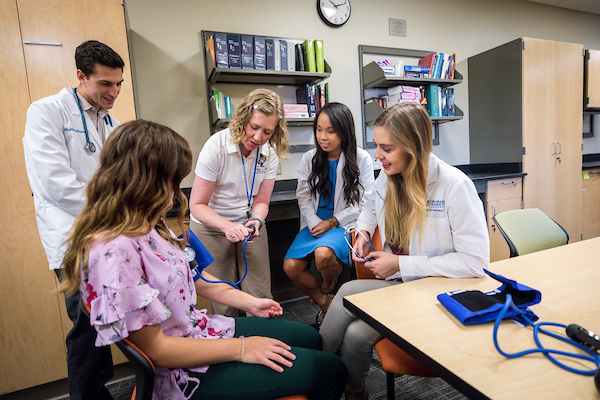Experiential education & patient care training labs
Our commitment at Concordia University Wisconsin School of Pharmacy is to provide you with unparalleled hands-on learning experiences in real-world patient care settings. This applied learning occurs predominantly in two settings: simulated patient care laboratories on campus and actual patient care sites providing pharmacy services. You will receive guidance and instructions from our own dedicated faculty and from healthcare professionals in some of the Midwest's top-rated healthcare organizations.
Applied patient care
The profession of pharmacy is dynamic and changing. To practice in the full scope of your pharmacist license as an integral member of the health care provider team, you need the skills both for today and for the future.
Our School of Pharmacy utilizes eight patient care teaching laboratories in the curriculum. This includes the six Applied Patient Care (APC) courses, the pharmaceutics laboratory where non-sterile compounding skills are developed, and the advanced pharmaceutics laboratory where sterile compounding skills are developed.
Applied patient care teaching laboratory

In the Applied Patient Care (APC) Teaching Laboratory, you will develop the skills needed to help patients improve their lives with medications by practicing the following:
- Medication histories
- Comprehensive patient health histories
- Patient education on new and refill medications
- Care plan development and delivery
- Physical assessment
- Immunization, and patient self-injection administration and education
- Clinical documentation
- Inter-professional provider communication
- Self-evaluation and reflection
- Peer evaluation
- Lifelong learning and professional development
Learn in a safe and controlled environment
From the start of your first week in APC lab through the last week in the P3 year, you will learn to provide pharmacy care to simulated patients in person as well as work through patient cases based on real-life patient scenarios. As a student, you will learn from pharmacists who are actively providing care for patients, and their expertise will prove to be a key part of your learning experience. With over 20 pharmacists serving in the APC labs, you will be taught in 1-to-2 and 1-to-3 ratios. This smaller-group learning creates a better environment for assessment and feedback that will help you advance your patient-care skills.
Experiential education: IPPEs and APPEs
The experiential education portion of our curriculum is a critical element in your learning experiences. We partner with hospitals, clinics, and pharmacies throughout Wisconsin which translates to invaluable clinical experiences for you.
Our academic calendar model incorporates two-week blocks of dedicated time for Introductory Pharmacy Practice Experiences (IPPEs). The IPPEs establish a method for understanding the pharmacist’s role in patient care early in your pharmacy career.
For PharmD students, the Office of Experiential Education coordinates IPPEs, which occur during the first three years of the professional degree program, and Advanced Pharmacy Practice Experiences (APPEs) during the P4 year.
Students aren’t responsible for finding their own rotation sites, but requests for rotation sites can be submitted to the Office of Experiential Education. Students will enter preferences for all rotations in the PharmD program.
IPPE rotation information
The School of Pharmacy offers both required and elective Introductory Pharmacy Practice Experiences (IPPEs) for P1-P3 PharmD students.
The required IPPE courses occur during each semester of the P1 and P2 years. Two weeks in the middle of each semester are devoted to required IPPE rotations. There are no didactic courses on campus during these weeks which lets students focus their learning on the experiential site.
During each of the first four semesters, students will complete a one-week rotation in a hospital pharmacy and a one-week rotation in a community/retail pharmacy.
Elective IPPE courses are offered during each semester of the P3 year. Elective IPPE courses are longitudinal, semester-long experiences that can focus on more specialized areas of pharmacy practice (e.g. infectious disease, ambulatory care, oncology).
APPE rotation information
APPEs are a series of full-time experiential education rotations during the P4 year that provide students with the opportunity to further develop their skills and knowledge base in pharmacy practice. Each APPE is 6-weeks long. The APPEs also provide students the opportunity to serve various patient populations in a variety of settings, and to collaborate with other healthcare professionals.
All P4 students will complete the following required APPEs:
- Community Pharmacy
- Acute Care Medicine
- Ambulatory Care
- Hospital/Health System Pharmacy
P4 students will also be able to select 3-4 elective APPEs based on their individual interests and career goals. Examples of APPE electives could include critical care, compounding, nuclear pharmacy, transplant, specialty pharmacy, and many more.
Contact the experiential education staff
The Office of Experiential Education can answer questions specific to experiential learning at Concordia Wisconsin School of Pharmacy.
Melissa Theesfeld, PharmD
Assisstant Dean for Clinical Affairs, Director of Experiential Education
262-243-2769
melissa.theesfeld@cuw.edu
Sarah Peppard, PharmD, BCPS, BCCCP
Assistant Director of Experiential Education
262-243-2757
sarah.peppard@cuw.edu
Peggy Pfeiffer, BA
Program Coordinator for Experiential Education
262-243-2754
peggy-pfeiffer@cuw.edu